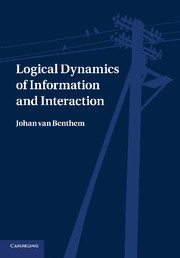Book contents
- Frontmatter
- Contents
- Preface
- Acknowledgments
- 1 Logical dynamics, agency, and intelligent interaction
- 2 Epistemic logic and semantic information
- 3 Dynamic logic of public observation
- 4 Multi-agent dynamic-epistemic logic
- 5 Dynamics of inference and awareness
- 6 Questions and issue management
- 7 Soft information, correction, and belief change
- 8 An encounter with probability
- 9 Preference statics and dynamics
- 10 Decisions, actions, and games
- 11 Processes over time
- 12 Epistemic group structure and collective agency
- 13 Logical dynamics in philosophy
- 14 Computation as conversation
- 15 Rational dynamics in game theory
- 16 Meeting cognitive realities
- 17 Conclusion
- References
- Index
11 - Processes over time
Published online by Cambridge University Press: 07 October 2011
- Frontmatter
- Contents
- Preface
- Acknowledgments
- 1 Logical dynamics, agency, and intelligent interaction
- 2 Epistemic logic and semantic information
- 3 Dynamic logic of public observation
- 4 Multi-agent dynamic-epistemic logic
- 5 Dynamics of inference and awareness
- 6 Questions and issue management
- 7 Soft information, correction, and belief change
- 8 An encounter with probability
- 9 Preference statics and dynamics
- 10 Decisions, actions, and games
- 11 Processes over time
- 12 Epistemic group structure and collective agency
- 13 Logical dynamics in philosophy
- 14 Computation as conversation
- 15 Rational dynamics in game theory
- 16 Meeting cognitive realities
- 17 Conclusion
- References
- Index
Summary
The preceding chapters took our study of rational agency from single update steps to mid-term activities like finite games that mix agents' actions, beliefs, and preferences. In the limit, this leads to long-term behaviour over possibly infinite time, that has many features of its own. In particular, in addition to information about facts, agents can now have procedural information about the process they are in. This chapter makes a junction between dynamic epistemic logic and temporal logics of discrete events, occurring in philosophy, computer science, and other disciplines. We prove semantic representation theorems, and show how dynamic-epistemic languages are fragments of temporal ones for the evolution of knowledge and belief. Amongst other things, this gives a better understanding of the balance between expressive power and computational complexity for agent logics. We also show how these links, once found, lead to merges of ideas between frameworks, proposing new systems of PAL or DEL with informational protocols.
Information
- Type
- Chapter
- Information
- Logical Dynamics of Information and Interaction , pp. 228 - 252Publisher: Cambridge University PressPrint publication year: 2011
